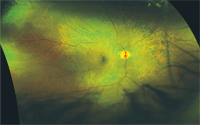Researchers at the University of Iowa uncovered a new genetic cause of retinitis pigmentosa (RP) that predominantly occurs in individuals of Jewish descent, according to a study in the August 23 issue of the Proceedings of the National Academy of Sciences.

An Optomap (Optos) image of retinitis pigmentosa.
The researchers determined that one individual who presented with RP exhibited a specific mutation of the MAK (male germ cell-associated kinase) protein located in the retina. After documenting this finding, the researchers screened the DNA of 1,798 patients with RP and determined that 20 additional individuals had the same MAK mutation. Of note, all 21 affected individuals were of Jewish ancestry.
The researchers then generated induced pluripotent stem cells (iPSCs) from the affected individuals’ skin and developed retinal tissue samples for further testing. After analyzing the tissue samples, the researchers noted that the gene mutation caused a disruption of mature MAK protein production, consequently inhibiting proper retinal function.
Based on this work, the research team hopes to explore gene therapy and cell replacement strategies as potential treatments for this form of RP.
Tucker BA, Scheetz TE, Mullins RF, et al. Exome sequencing and analysis of induced pluripotent stem cells identify the cilia-related gene male germ cell-associated kinase (MAK) as a cause of retinitis pigmentosa. Proc Natl Acad Sci U S A. 2011 Aug 23;108(34):E569-76.

